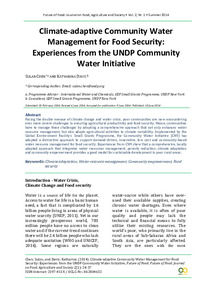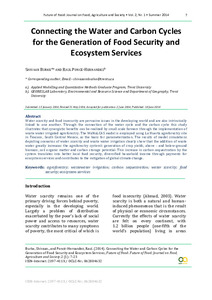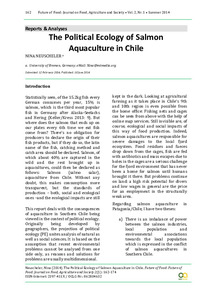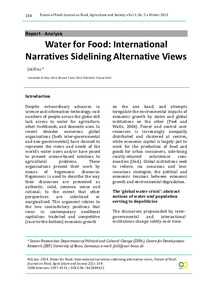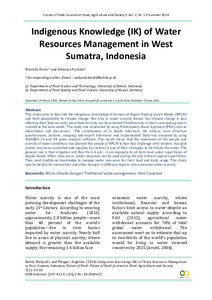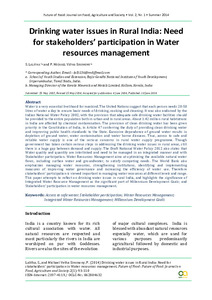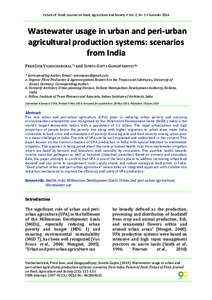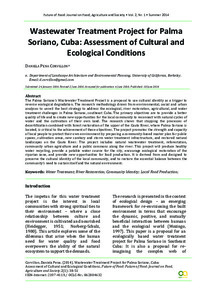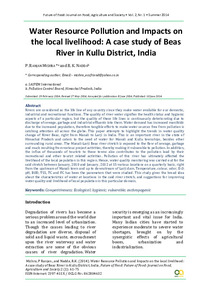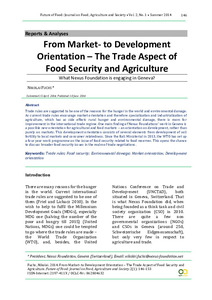Suche
Anzeige der Dokumente 1-10 von 12
Aufsatz
 Climate-Adaptive Community Water Management for Food Security: Experiences from the UNDP Community Water Initiative
Climate-Adaptive Community Water Management for Food Security: Experiences from the UNDP Community Water Initiative
(Department of Organic Food Quality and Food Culture at the University of Kassel, Germany and Federation of German Scientists (VDW), 2014-06-10)
Facing the double menace of climate change threats and water crisis, poor communities have now encountered ever more severe challenges in ensuring agricultural productivity and food security. Communities hence have to manage these challenges by adopting a comprehensive approach that not only enhances water resource management, but also adapts agricultural activities to climate variability. Implemented by the Global Environment Facility’s Small Grants Programme, the Community Water Initiative (CWI) has adopted a ...
Aufsatz
 Connecting the Water and Carbon Cycles for the Generation of Food Security and Ecosystem Services
Connecting the Water and Carbon Cycles for the Generation of Food Security and Ecosystem Services
(Department of Organic Food Quality and Food Culture at the University of Kassel, Germany and Federation of German Scientists (VDW), 2014-06-10)
Water scarcity and food insecurity are pervasive issues in the developing world and are also intrinsically linked to one another. Through the connection of the water cycle and the carbon cycle this study illustrates that synergistic benefits can be realized by small scale farmers through the implementation of waste water irrigated agroforestry. The WaNuLCAS model is employed using La Huerta agroforestry site in Texcoco, South Central Mexico, as the basis for parameterization. The results of model simulations depicting ...
Aufsatz
 The Political Ecology of Salmon Aquaculture in Chile
The Political Ecology of Salmon Aquaculture in Chile
(Department of Organic Food Quality and Food Culture at the University of Kassel, Germany and Federation of German Scientists (VDW), 2014-06-10)
Every German consumes per year, 15% is salmon, which is the third most popular fish in Germany after Alaska-Seelachs and Hering (Keller/Kress 2013: 9). But where does the salmon that ends up on our plates every 6th time we eat fish come from? There's no obligation for producers to declare the origin of their fish products, but if they do so, the latin name of the fish, catching method and catch area should be declared. Salmon, of which about 40% are captured in the wild and the rest brought up in aquacultures, could ...
Aufsatz
 Water for Food: International Narratives Sidelining Alternative Views
Water for Food: International Narratives Sidelining Alternative Views
(Department of Organic Food Quality and Food Culture at the University of Kassel, Germany and Federation of German Scientists (VDW), 2014-06-10)
Aufsatz
 Indigenous Knowledge (IK) of Water Resources Management in West Sumatra, Indonesia
Indigenous Knowledge (IK) of Water Resources Management in West Sumatra, Indonesia
(Department of Organic Food Quality and Food Culture at the University of Kassel, Germany and Federation of German Scientists (VDW), 2014-06-10)
This study was aim to describe the indigenous knowledge of farmers at Nagari Padang laweh Malalo (NPLM) and their adaptability to climate change. Not only the water scarcity is feared, but climate change is also affecting their food security. Local food security can be achieved if biodiversity in their surrounding area is suitable to the local needs. The study was conducted by using Participatory Rural Appraisal (PRA) such as observation and discussion. The combination of in depth interview, life history, semi structure ...
Aufsatz
 Drinking water issues in Rural India: Need for stakeholders’ participation in Water resources management
Drinking water issues in Rural India: Need for stakeholders’ participation in Water resources management
(Department of Organic Food Quality and Food Culture at the University of Kassel, Germany and Federation of German Scientists (VDW), 2014-06-10)
Water is the very essential livelihood for mankind. The United Nations suggest that each person needs 20-50 litres of water a day to ensure basic needs of drinking, cooking and cleaning. It was also endorsed by the Indian National Water Policy 2002, with the provision that adequate safe drinking water facilities should be provided to the entire population both in urban and in rural areas. About 1.42 million rural habitations in India are affected by chemical contamination. The provision of clean drinking water has ...
Aufsatz
 Wastewater usage in urban and peri-urban agricultural production systems: scenarios from India
Wastewater usage in urban and peri-urban agricultural production systems: scenarios from India
(Department of Organic Food Quality and Food Culture at the University of Kassel, Germany and Federation of German Scientists (VDW), 2014-06-10)
The role urban and peri-urban agriculture (UPA) plays in reducing urban poverty and ensuring environmental sustainability was recognized by the Millennium Development Goals (MGDs). India is the world’s largest democratic nation with a population of 1.2 billion. The rapid urbanization and high proportion of people below the poverty line along with higher migration to urban areas make India vulnerable to food crisis and urbanization of poverty. Ensuring jobs and food security among urban poor is a major challenge in ...
Aufsatz
 Wastewater Treatment Project for Palma Soriano, Cuba: Assessment of Cultural and Ecological Conditions
Wastewater Treatment Project for Palma Soriano, Cuba: Assessment of Cultural and Ecological Conditions
(Department of Organic Food Quality and Food Culture at the University of Kassel, Germany and Federation of German Scientists (VDW), 2014-06-10)
The Palma Project is an experiment in the use of cultural identity as a social trigger to address ecological degradation. The research methodology draws from environmental, social and urban analyses to unveil the best strategy to address the ecological, river restoration and water treatment challenges in Berkeley, California’s “Sister City” in southeast Cuba, Palma Soriano. The objective is to provide a better quality of life and to create new opportunities for the local community to reconnect with natural cycles ...
Aufsatz
 Water Resource Pollution and Impacts on the local livelihood: A case study of Beas River in Kullu District, India
Water Resource Pollution and Impacts on the local livelihood: A case study of Beas River in Kullu District, India
(Department of Organic Food Quality and Food Culture at the University of Kassel, Germany and Federation of German Scientists (VDW), 2014-06-10)
The rivers are considered as the life line of any country since they make water available for our domestic, industrial and recreational functions. The quality of river water signifies the health status and hygienic aspects of a particular region, but the quality of these life lines is continuously deteriorating due to discharge of sewage, garbage and industrial effluents into them. Thrust on water demand has increased manifolds due to the increased population, therefore tangible efforts to make the water sources ...
Aufsatz
 From Market- to Development Orientation - The Trade Aspect of Food Security and Agriculture
From Market- to Development Orientation - The Trade Aspect of Food Security and Agriculture
(Department of Organic Food Quality and Food Culture at the University of Kassel, Germany and Federation of German Scientists (VDW), 2014-06-10)
Trade rules are suggested to be one of the reasons for the hunger in the world and environmental damage. As current trade rules encourage market orientation and therefore specialization and industrialization of agriculture, which has as side effects rural hunger and environmental damage, there is room for improvement in the international trade regime. One main finding of Nexus Foundations' work in Geneva is a possible new orientation for agricultural and food markets – an orientation on development, rather than purely ...

